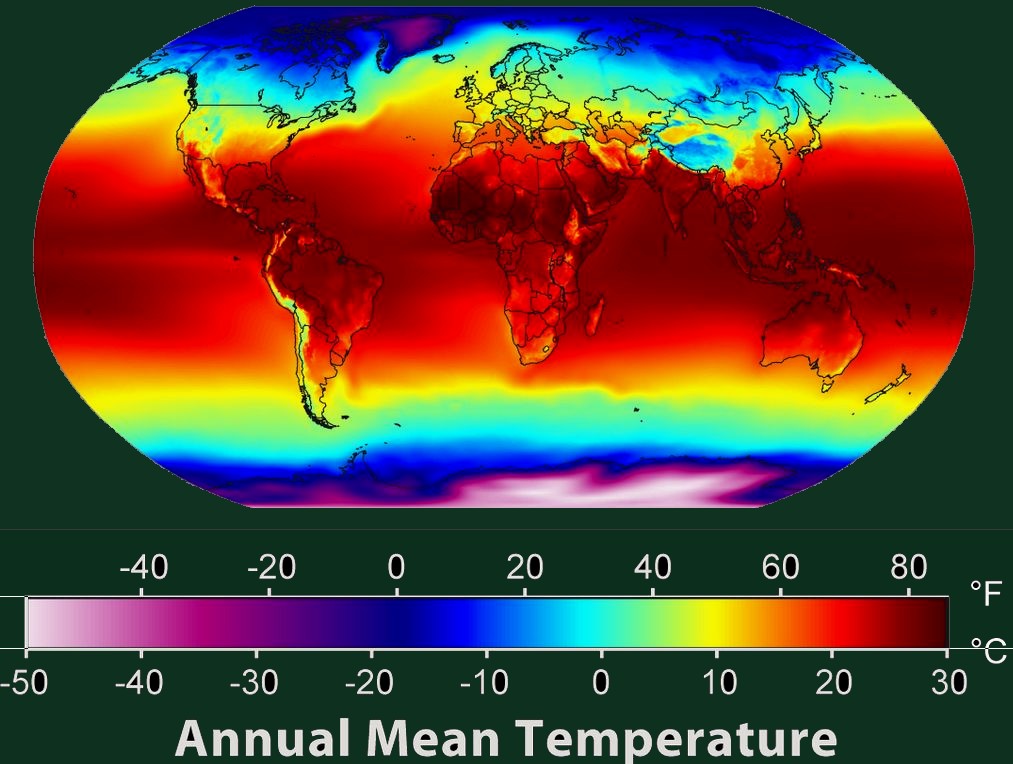"The Sydney Morning Herald has discussed what happens when the global mean temperature increases by 4 °C:
Too hot to handle: can we afford a 4-degree rise?
Kevin Anderson, a director of a Tyndall Centre somewhere in the U.K., sees it in this way:
"If you have got a population of 9 billion by 2050 and you hit 4 degrees, 5 degrees or 6 degrees, you might have half a billion people surviving."
So the population will happily continue to rise to 9 billion by 2050. Suddenly, the global mean temperature will apparently jump from 15 °C to 20 °C, we're told, and 8.5 billion people will suddenly die because 20 °C is surely deadly.
I wonder whether those loons actively realize what they are saying - and what their colleagues are saying - and whether at least some of them know that the likes of Mr Anderson are mentally ill.
Needless to say, there doesn't exist any empirically based reason to think that the temperature change in the next 40 years will exceed something like 0.5 °C - see all RSS cooling and warming trends (which imply that the very sign of the future temperature changes are unknown) - so five degrees is already an overestimate by one order of magnitude.
However, if the planet were warmer by 5 °C, just imagine this nonsense for the sake of it, we could notice the difference but we would surely see no substantial death rate. In fact, that's about the point at which the warm-weather-related deaths would match the cold-weather-related deaths. At this point, the number of temperature-related deaths would probably be minimized. That's not a shocking insight - after all, 20 °C is the temperature we like in our living rooms - I actually favor 23 °C but it is not far - so if this is also chosen to be the global mean temperature, the planet will surely become more comfortable than it is now.
But it's amazing that those people don't realize how little 4 °C is for our planet. Every year, the seasons change the temperature at every place away from the equator by dozens of degrees. Every 24 hours, we experience a day-night temperature difference comparable to 4 °C, too. The different places on the globe differ, too:
Put in a nutshell, what this "climate scientist" is saying is that if 100 people move from Hobart, Tasmania to Cooktown, Queensland then 95 of them will not survive the transition. This is because Cooktowns mean temperature, according to the above diagram, is more then 20 degrees C!
This is the calibre of the "experts" that Julia Gillard has based her "science is settled" carbon tax on.
A cooling by 5 °C would have a higher impact because ice sheets would begin to grow at many places which would change the environment "qualitatively": that's why the ice ages were pretty different. But that's only because on the downside, we're pretty close to a phase transition, the freezing point of water, 0 °C, when certain important things change discontinuously.
However, the continental ice sheets have been gone for thousands of years and we're extremely far from the next similar point, the boiling point of water at 100 °C. So you can't be shocked that an increase of the temperature by an extra 5 °C will make no qualitative difference to the Earth. It would be indisputably measurable if it occurred - unlike the controversial increases by 0.6 or 0.8 °C attributed to the last century - but "measurable" doesn't imply "worrisome".
I have discussed those points many times, see e.g. 13 °C of warming would be fine for life.
After a stream of preposterous statements how the Earth and maybe the Milky Way would collapse if the temperatures grew by 4 °C, another alarmist called David Spratt makes the following punch line of the article:
‘And we are talking about how we might adapt to a 4-degree warmer world,’’ Spratt wrote. ‘‘Have we gone mad?’
Well, you surely have. There is absolutely no problem for humans and others to move from 15 °C to 20 °C and there is no reason to even talk about the question how they will adapt. The only adaptation will be done by the farmers - and the adaptation will simply be that they don't have to work so much to get the same results.
Do you find it hard to imagine a world that is warmer by 4 °C? How will all the layers of the atmosphere, oceans, and ecosystems react? Well, this may be a hard homework exercise to calculate but there's a simple way to solve it: look at the map above and find a place that is 4 °C warmer than the place where you currently live. Think about the ways how the ecosystems, people, and economies can survive over there today - and you will understand how your place would be doing if the temperature increased by ten times more than it can realistically increase.
Nothing would change much."

No comments:
Post a Comment